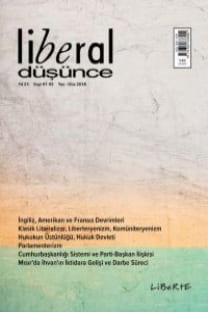Locke’un Siyasal Zoolojisi: Yasa, Hayvan ve Egemen
Locke’s Political Zoology: Law, Animal and the Sovereign
___
- AGAMBEN, Giorgio, Açıklık: İnsan ve Hayvan, çev.: Meryem Mine Çilingiroğlu, Yapı Kredi Yayınları, İstanbul 2009.
- ARİSTOTELES, Politika, çev.: Mete Tunçay, Remzi Kitabevi, İstanbul 1993.
- ARİSTOTELES, Nikomakhos’a Ethik, çev.: Saffet Babur, Ayraç Yayınevi, Ankara 1998.
- BARBER, Benjamin R. Strong Democracy: Participatory Politics for a New Age, University of California Press, Berkeley 1984.
- BODİN, Jean, Six Books of the Commonwealth. Abridged and translated by M. J.. Tooley. Oxford: Blackwell’s Political Texts, Pp. xlviii + 212, 1955. http://www.yorku.ca/comninel/courses/3020pdf/six_books.pdf
- ÇORUHLU, Yaşar, Türk Mitolojisinin Ana Hatları, Kabalcı Yayınevi, İstanbul 2002.
- DARMON, Jean P., “Hayvanlar ve Mitoloji. Yunan Mitolojisinde Hayvanların Anlamsal Değeri”, Antik Dünya ve Geleneksel Toplumlarda Dinler ve Mitolojiler Sözlüğü I. Cilt (A-K), (yöneten Yves Bonnefoy; yay. haz. Levent Yılmaz), Dost Kitabevi Yayınları, Ankara 2000.
- DUNN, John, Locke, çev.: Hakan Gür, Dost Yayınları, Ankara 2009.
- ERASMUS, Desiderius, The Education of a Christian Prince, Edited and translated by Lisa Jardine. Cambridge: Cambridge University Press, 1997.
- HOBBES, Thomas, Leviathan, çev.: Semih Lim, 3. baskı, Yapı Kredi Yayınları, İstanbul 2001.
- LOCKE, John, İnsanın Anlama Yetisi Üzerine Bir Deneme, çev.: Meral Delikara Topçu, Öteki Yayınevi, Ankara 1999.
- LOCKE, John, “The Second Treatise on Government”, Ian Shapiro (Ed.), Two Treatises of Government and A Letter Concerning Toleration, (ss. 100-214) içinde, Yale University Press, New Haven, Conn. 2003.
- LOCKE, John, “The First Treatise: The False Principles and Foundation of Sir Robert Filmer”, Ian Shapiro (Ed.), Two Treatises of Government and A Letter Concerning Toleration, (s. 7-99) içinde, Yale University Press, New Haven, Conn. 2003.
- KALFF, Sabine, “Are Cranes Republicans? A Short Chapter in Political Ornithology”, Karl A. E. Enenkel & Paul J. Smith (ed) Zoology in Early Modern Culture: Intersections of Science, Theology, Philology, and Political and Religious Education içinde, Brill Academic Publishers, 2014, s. 437-459.
- KRELL, David Farrell, Derrida And Our Animal Others: Derrida’s Final Seminar, The Beast And The Sovereign. Bloomington:Indiana University Press, 2013.
- MACHİAVELLİ, Niccolo, Prens, çev.: Nevin Yeni, Alfa Yayıncılık, İstanbul 2005.
- WOOLHOUSE, Roger, John Locke, çev.: Akın Terzi, Türkiye İş Bankası Kültür Yayınları, İstanbul 2011.
- WORCESTER, John, Correspondences of the Bible: The Animals, New Edition Boston: Massachusetts New Church Union, 1926.
- TOKU, Neşet, John Locke ve Siyaset Felsefesi, Liberte Yayınları, Ankara 2003.
- YILDIRIM, Nimet, Fars Mitolojisi Sözlüğü, Kabalcı Yayınları, İstanbul 2008.
- ISSN: 1300-8781
- Başlangıç: 1996
- Yayıncı: Liberte Yayınları
Hukuk Devleti ve Hukukun Üstünlüğü Kavramları: Albert Venn Dicey ve Hans Kelsen
Liberteryen Teoride Özgürlüğün ve Siyasetin Sınırları
Mısır’da İhvan-ı Müslimin’in İktidara Geliş Süreci ve Temmuz Darbesinin Nedenleri Üzerine
Locke’un Siyasal Zoolojisi: Yasa, Hayvan ve Egemen
Edmund Burke’ten Hareketle Devrim Eleştirisi
Schmitt’in Hayaleti ve Parlamentarizmin Krizi
Devlet Başkanı ve Siyasî Parti İlişkisi Üzerine
Liberal - Komüniteryen Tartışması
İngiliz ve Amerikan Devrimlerine Fransız Devrimi Üzerinden Bir Bakış
